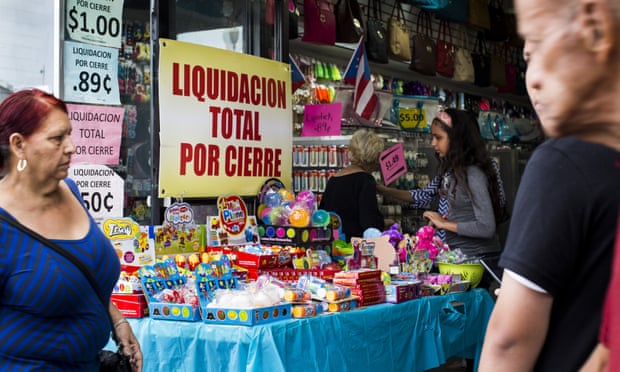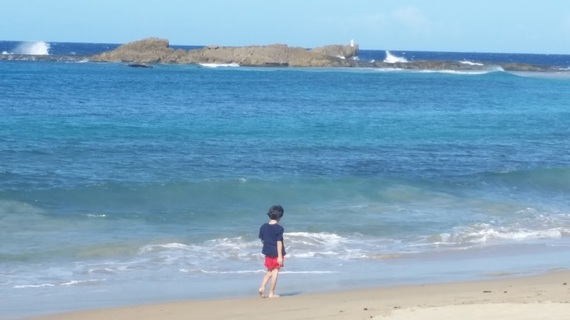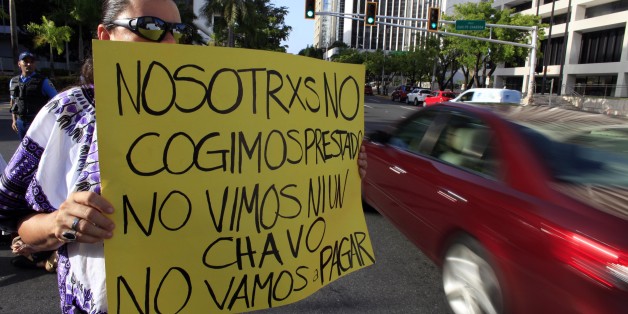In the last few months Puerto Rico’s economic crisis has become pretty famous. People talk about the financial instability of the islands of Puerto Rico, as much as they used to dance the
Gasolina of Daddy Yankee, or
La Vida Loca from Ricky Martin. Truth is, things are rough and now more than ever Puerto Ricans need to dance. Not just for fun, but to escape from the reality of a precarious livelihood and an uncertain future.
Some people say that the United States Territory of Puerto Rico has around a 72 billion dollar debt to bond holders. It is still not clear how the Puerto Rican government acquired so much debt, or how the money was spent. Most of this seems to be an Odious Debt, in which citizens of the islands have not benefited from the borrowed money. The money was not necessarily used to build roads, schools, and hospitals or to create projects of public interest. This is why this debt needs to be audited, first of all.
But most people in the United States and in Puerto Rico accept the narrative of the 72 billion dollar debt as they would accept Medalla beer or a Malta for those who don’t drink. Without necessarily understanding or questioning the debt accumulated and where it comes from.
This is the case of Pulitzer-prize winner, Lin-Manuel Miranda who humbly kneeled before Speaker Paul Ryan to ask for mercy and approve a bill that will ease Puerto Rico’s economic crisis and pay the debt. He even offered free tickets for his Broadway show Hamilton in order to push legislation for Puerto Rico (this would be considered extortion in other scenarios). But if Miranda wants to contribute something to his Puerto Rican people, he should stop offering free tickets and maybe use some of those royalties from Hamilton’s costly tickets to start a fund that could help the soon starving young workers and students of Puerto Rico.
In Miranda’s own words “The good news is that Speaker Paul Ryan has fulfilled his promise: he worked together with Republicans and Democrats, and has created a bill that will determine the immediate future of Puerto Rico.” This bill (H.R. 5278) is the Puerto Rico Oversight, Management, and Economic Stability Act, better known as PROMESA, which was developed by the Committee of Natural Resources under Chairman Rob Bishop, and recently approved in the United States House of Representatives with a vote of 297 to 127.
PROMESA proposes the establishment of an Oversight Board with seven members appointed by the United States President, who will be granted totalitarian control over Puerto Rico’s finances in order to restructure the Puerto Rican debt, which equals to: “Fuck you pay me”. Section #4 of the bill says, “The provisions of this Act shall prevail over any general or specific provisions of territory law, State law, or regulation that is inconsistent with this Act.”
Nevertheless, the creation of an apparatus like PROMESA should not be a surprise. The United States Congress had total control over the insular government of Puerto Rico, ever since the Foraker Act was approved in 1900. It wasn’t until the creation of the Free Associated State Constitution (ELA) in 1952, that Puerto Ricans were granted the right to elect their own governor and handle the internal administration of the country. Still when the United States Congress approved this, they sustained the capacity of imposing legislation over Puerto Rico’s Government and retaining ultimate power over all of Puerto Rico’s affairs.
Today is a historical moment: we are seeing how the United States Congress is making use of that supremacy they secured more than half a Century ago. The consequences are still to be seen. Some people talk about an ongoing humanitarian crisis, but the real humanitarian crisis is going to come when seven business men come to Puerto Rico to elaborate an economic plan as they get drunk on Barrilito in the beach of the San Juan Hotel.
However, many Puerto Ricans in the homeland have a welcoming sentiment towards the Oversight Board. According to a recent poll from El Nuevo Día, 46% of the citizens in Puerto Rico favor the Oversight Board or Junta de Control Fiscal, as it is locally known. Fed up with corruption and incapacitated officials administering the territory, it is understandable the frustration among the islanders and their lack of faith in the local government. A weak leadership on the left also aggravates this, which for decades has been unable to present itself as viable alternative to the country’s development.
This puts all the pieces in the right place for a checkmate!
According to many members of the Democratic Party, PROMESA is the only help the Republican-Controlled Congress is willing to enact on Puerto Rico and we must make “Lemonade out of Lemons”. Ironically on June 9th, more Democrats than Republicans voted in favor of this bill in the House of Representatives (158 Democrats versus 139 Republicans).
Puerto Rican workers have been making lemonade out of pee since the economic crisis started to hit in 2006. Precarious jobs are on the rise, professional services are not paid well and employment opportunities are scarce. PROMESA does not propose to do anything about this, on the contrary it will make the economic crisis worse on workers, while rewarding corporations and making sure that bondholders keep receiving monthly payments.
One of the most controversial provisions of the bill is the reduction of the federal minimum wage from $7.25 to $4.25 an hour for workers 25 years old and younger. The last time hourly wages were this low was about 20 years ago. Gas, tripletas and condoms are more expensive now. Still, employers can pay $4.25 an hour to workers 20 years old and under, but they can only do so for the first 90 days of employment. PROMESA changes that for Puerto Rico; it doesn’t establish a cap on days and elevates the age to 25.
The side effects of a $4.25 an hour to young workers, are more than we can think of. It represents the postponement of economic independence for young adults, and in many cases limits the capability of contributing economically to their household. The bill doesn’t take into consideration parents under 25 or young workers who their own parents rely on, with all the layoffs in recent years and pensions at risk. The necessities of college students are also outside of the map inside this provision, not taking into account how many of them rely on their wages to pay for university studies, books and housing.
$4.25 x 40 hours = $170 of weekly gross income.
If you’re a full-time worker, $170 (before taxes) is what as a young worker you will have pa’ resolvértelas in the most expensive country of Latin America. Isla del Encanto, where gas, utilities and groceries are more expensive than the average in the United States. $170 a week, that’s if you’re lucky.
As the deregulation of labor continues to be the trend in this century, employers hire less full-time workers and young workers need to conform with only working 15 to 35 hours a week with no benefits or regularity. You make the math for that one. PROMESA promises: to give corporations a legal tool on “How to Make More Profit Out of the Sweat of Young Puerto Ricans”.
The $4.25 wage also poses a threat to older workers. Even though the bill states, “No employer may take any action to displace employees (including partial displacements such as reduction in hours, wages, or employment benefits) for purposes of hiring individuals at the wage authorized ($4.25)” it is easy for an employer to do exactly that, they just need to find ways around the legality of their intentions. Union jobs could be safer in this sense, but non-unionized workers on a precarious situation could be fired or punished for any fault that goes against the employer according to their established policies.
Then, there will be a job opening starting immediately at $4.25 an hour for a: “committed, motivated and energetic individual, who is able to work under-pressure and enjoys working flexible hours”. Isn’t this what most job postings say?
Something else that the PROMESA sponsors don’t take into consideration is the chance of delinquency increment in the islands of Puerto Rico if a sector of the population was to make less money. This is what happens when you have Republicans from Utah and Wisconsin writing a legislation that concerns a Caribbean Third-World Colony of the United States. There is already lack of employment opportunities in Puerto Rico, and unfortunately many youngsters who’ve been abandoned by the education system struggle even more.
Puerto Rico has decaying public education system, and a bill like PROMESA facilitates the closing of schools and education programs in order to pay the debt. This could represent many more school dropouts in the upcoming years that will enter the labor world of $4.25 an hour. Between a job that offers $4.25 an hour versus a robust and stable underground economy in Puerto Rico with opportunities of advancing, hustling in the streets becomes very tempting. Young people don’t want to be 425 slaves.
I don’t think that most candidates aspiring for Puerto Rico’s governance understand the social impacts of a $4.25 minimum wage, but they all have expressed their opposition to it (there are many voters between ages 18 and 25). This is the only provision in PROMESA’s bill that requires the governor of Puerto Rico to directly sing on, any other administrative decisions of the Oversight Board can be done without the authorization or approval of Puerto Rico’s governor. This is not a guarantee that a $4.25 minimum wage will not be implemented.
For example, we’ve seen in the past how gubernatorial candidates have expressed their opposition of adopting sale taxes, and once in office they’ve done the entire opposite. Such is the case of former governor Anibal Acevedo Vilá, who said he would never approve a 7% sales tax and later argued he had no choice. Alejandro García Padilla, the current governor brought a VAT of 11.5%.
A waiver to the federal minimum wage doesn’t only represent a threat to the Puerto Rican people; this could also establish a precedent for other states in the union. While in the United States workers are fighting for a $15 dollar an hour minimum wage, young Puerto Ricans face the possibility of less than $5 in the upcoming years. This is why labor unions are very attentive to this case, including the SEIU and the UAW who have opposed this bill. But, Hillary Clinton (the presidential candidate they’ve endorsed) said “While I have serious concerns about several provisions in this bill, including the creation of an oversight board that would exert substantial control over Puerto Rico, I believe that we must move forward with this legislation”.
Soon, PROMESA will be discussed in the United States Senate. Sources say that the Senate will try to pass this like Steph Curry on a fast break ahead of Puerto Rico’s next bond payment in July 1st.
At this stage, the only hope to kill this bill inside Congress lies possibly on Senator Bernie Sanders, who the Puerto Rican democrats didn’t favor in the presidential primaries of the territory. Clinton won big in Puerto Rico, but it seems that Sanders didn’t take it personal. In opposition to PROMESA, he has done more than proposing amendments to the bill. Sanders, has introduced the Puerto Rico Humanitarian Relief Act, which doesn’t establish an Oversight Board or includes a $4.25 minimum wage reduction. Still, Sanders legislation needs to be expanded upon according to Natasha Lycia Ora Bannan, president of National Lawyers Guild.
Meanwhile in Puerto Rico, groups are organizing, coalitions have been formed, and the possibility of practicing civil disobedience to challenge the Oversight Board it’s been openly discussed. A massive people assembly to organize against PROMESA has been called for June 25th by Puerto Rico Contra la Junta at the Roberto Clemente Coliseum in the Capital City of San Juan. In the Puerto Rican Diaspora, groups are organizing too. The fight against PROMESA could be the next Vieques, the next Adjuntas, or the next student movement.
 Juan C. Dávila
PROMESA: Puerto Rico's "Restructure" at $4.25 an Hour
Juan C. Dávila
PROMESA: Puerto Rico's "Restructure" at $4.25 an Hour











